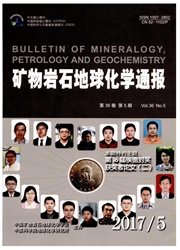

 中文摘要:
中文摘要:
陕西丁家林-四川太阳坪-四川董家院北东向金矿带位于后龙门山陆内造山带,构造动力学背景为陆-陆板块碰撞而形成的逆冲推覆造山带,金矿带内发育一系列与陆内造山作用密切有关的北东向递进脆-韧性剪切带。本文以构造-岩相学新方法为指导,在矿田构造-岩相学层次上,通过实测构造-岩相学剖面和岩石地球化学研究,对该金矿带物质学和运动学特征研究表明,赋矿地层志留系黄坪组(S1-2hn)区域性岩相学特征整体为陆棚相。黄坪组中部层间流体活动强烈,地壳浅部富 Fe-Mg-CO32–型构造流体活动形成了斑点状铁碳酸盐千枚岩相;随构造变形层次加深,强应变带发育构造片岩相和初糜棱岩相,富SiO2型流体排泄的构造分异成岩作用形成了流变状糜棱岩相。强烈的构造成岩作用及造山带流体的大规模排泄形成了糜棱岩相,同位发育密集的流变状糜棱岩相和蚀变菱铁矿铁白云石网脉相。构造流体成岩成矿作用集中于强应变带形成蚀变糜棱岩相,后期脆性蚀变碎裂岩相叠加时,金矿化(体)发育。早期韧性剪切和脆韧性剪切变形并叠加有后期脆性变形构造,富集 Au-Cu-Sb-W-Bi等元素组合。本区缺少或未见早三叠世以后形成的岩浆活动。大规模富Fe-Mg 碳酸盐型流体及同构造期造山带流体活动与龙门山陆内造山带密切相关,表明丁家林-太阳坪-董家院金矿为造山型金矿。
 英文摘要:
英文摘要:
The NE-trending Dingjialin-Taiyangping-Dongjiayuan gold ore belt is located in the Longmen Mountain thrust-nappe belt formed during the Indosinian collision of the North China Craton and Yangtze Plate. There are a series of the NE-trending brittle-ductile shear zones in the gold belt which are closely related to the intracontinental orogeny during the Mesozoic to the Cenozoic Era. Characteristics of materials and kinematics in the gold ore belt were studied based on the tectonic lithofacies analysis and measured section. The study shows that the scales of the brittle-ductile shear zones, intensity of tectonic deformation and fluid activities attenuated from the northwest to the southeast. The brittle-ductile shear zones exhibit notable tectonic lithofacies zoning features. First, the spotted ferri-carbonate phyllite phase occurred in the shallow crust which was associated with the Fe-Mg-CO32--rich type fluid. Secondly, as the structural deformation strengthened, the tectonic schist phase and incipient mylonite phase developed in strong strain zones associated with the SiO2-rich type fluid flow. Thirdly, the strong tectonic diagenesis and the large-scale orogenic fluid draining resulted in the rheomorphic mylonite phase and altered siderite-ankerite stockwork phase. Finally, in strong strain zones the altered mylonite phase formed due to tectonic fluid diagenesis and mineralization, whereas the gold ore or mineralization was caused by the later brittle altered cataclasite phase superimposition. The typical Au-Cu-Sb-W-Bi ore element association, absent of the post-early Triassic magmatism, massive orogenic fluid activities, as well as the structural features like early ductility to brittle-ductile shear deformation and superposition of later brittle deformation demonstrate that the Dingjialin-Taiyangping-Dongjiayuan gold deposits should be classified as orogenic-type.
 同期刊论文项目
同期刊论文项目
 同项目期刊论文
同项目期刊论文
 U–Pb zircon geochronology and geochemistry of Late Jurassic basalts inMaevatanana,Madagascar: implic
U–Pb zircon geochronology and geochemistry of Late Jurassic basalts inMaevatanana,Madagascar: implic LA-ICP-MS and EPMA studies on the Fe-S-As minerals from the Jinlongshan gold deposit,Qinling Orogen,
LA-ICP-MS and EPMA studies on the Fe-S-As minerals from the Jinlongshan gold deposit,Qinling Orogen, LA-ICP-MS trace element analysis of pyrite from the Chang’an gold deposit, Sanjiang region, China: I
LA-ICP-MS trace element analysis of pyrite from the Chang’an gold deposit, Sanjiang region, China: I Gold mineralization in Proterozoic black shales: Example from the Haoyaoerhudong gold deposit, north
Gold mineralization in Proterozoic black shales: Example from the Haoyaoerhudong gold deposit, north An assessment of selected heavy metal contamination in the surface sediments from theSouth China Sea
An assessment of selected heavy metal contamination in the surface sediments from theSouth China Sea Early Carboniferous adakitic rocks in the area of the Tuwu deposit, eastern Tianshan, NW China: Slab
Early Carboniferous adakitic rocks in the area of the Tuwu deposit, eastern Tianshan, NW China: Slab Geochronology, petrogenesis and tectonic implications of the Zhongchuan granitic pluton in the Weste
Geochronology, petrogenesis and tectonic implications of the Zhongchuan granitic pluton in the Weste Zircon U-Pb and molybdenite Re-Os geochronology, and whole-rock geochemistry of the Hashitu molybden
Zircon U-Pb and molybdenite Re-Os geochronology, and whole-rock geochemistry of the Hashitu molybden Geological characteristics and ore-forming process of the gold deposits in the western Qinling regio
Geological characteristics and ore-forming process of the gold deposits in the western Qinling regio SHRIMP zircon U-Pb geochronology, geochemistry and H-O-Si-S-Pb isotope systematics of the Kanggur go
SHRIMP zircon U-Pb geochronology, geochemistry and H-O-Si-S-Pb isotope systematics of the Kanggur go Geology, C–H–O–S–Pb isotope systematics and geochronology of the Yindongpo gold deposit, Tongbai Mou
Geology, C–H–O–S–Pb isotope systematics and geochronology of the Yindongpo gold deposit, Tongbai Mou Source and evolution of fluids in the Shihu gold deposit, Taihang Mountains, China: evidence from mi
Source and evolution of fluids in the Shihu gold deposit, Taihang Mountains, China: evidence from mi Geochemistry, petrogenesis and tectonic implications of the granitic plutons at the Liziyuan orogeni
Geochemistry, petrogenesis and tectonic implications of the granitic plutons at the Liziyuan orogeni Fluorescence studies on local density change in supercritical CO2 mixtures using the order parameter
Fluorescence studies on local density change in supercritical CO2 mixtures using the order parameter Origin of a barite-sulfide ore deposit in theMykonosintrusion, cyclades: Trace element, isotopic, fl
Origin of a barite-sulfide ore deposit in theMykonosintrusion, cyclades: Trace element, isotopic, fl One-step synthesis of bentonite-supported nanoscale Fe/Ni bimetals for rapid degradation of methyl o
One-step synthesis of bentonite-supported nanoscale Fe/Ni bimetals for rapid degradation of methyl o Geochemical characteristics of rare earth elements and their implications for the Huachanggou gold d
Geochemical characteristics of rare earth elements and their implications for the Huachanggou gold d Zircon U-Pb ages and geochemistry of the Wenquan Mo-bearing granitioids in WesternQinling,China: Con
Zircon U-Pb ages and geochemistry of the Wenquan Mo-bearing granitioids in WesternQinling,China: Con Discovery and significance of Cu–Zn intermetallic compounds in the Jingxi gold deposit, westernTians
Discovery and significance of Cu–Zn intermetallic compounds in the Jingxi gold deposit, westernTians Fluid inclusions from the Jinchang Cu–Au deposit,Heilongjiang Province,NEChina: Genetic style and ma
Fluid inclusions from the Jinchang Cu–Au deposit,Heilongjiang Province,NEChina: Genetic style and ma 期刊信息
期刊信息
